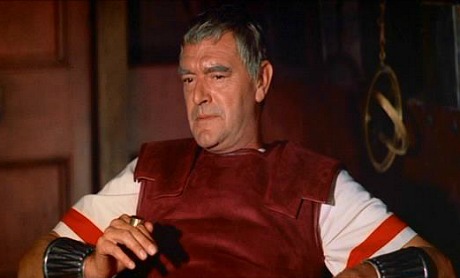A Charlie Rose Show-type setting. A large, round, polished oak table. Bottles of Fiji water, the usual dark background. The host is myself, and the guests are the late William Wyler, Jack Hawkins and Gore Vidal, all of whom helped create the 1959 version of Ben-Hur, along with original Ben-Hur author General Lew Wallace, still bearded and uniformed.
Jeffrey Wells: First of all, thank you all for coming. None of you are living, of course, but we appreciate your time nonetheless. Today’s topic, somewhat painful or at least uncomfortable to discuss, I realize, is the decision by the remakers of Ben-Hur — director Timur Bekmambetov, screenwriters Keith Clarke and John Ridley — to jettison the character of Quintus Arrius, the Roman general and nobleman who rescues Judah Ben-Hur from living death as an oar slave.
Wyler: For the sake of running time.
Vidal: The Arrius portions added up to roughly 30, 35 minutes. Which is one reason why our version, Willy, ran 212 minutes. The 1925 version ran…what was it, two and a half hours?
Wells: 143 minutes.
Wyler: And the new version, which of course we’ll never be able to see as they still won’t offer spectral streaming in heaven, despite numerous requests…
Vidal: Drop, it Willy. It’ll never happen.
Wells: The new version runs 123 minutes.
Hawkins: Who makes a film with the goal of eliminating characters from an original version to save time? If a character brings something good to a film, you keep him. Arrius is the only steady, fair-minded, comforting figure in Judah Ben-Hur’s life.
Vidal: The only character of consequence offering friendship and security, in the entire play. Or the film. At all.
Wallace: Except the Nazarene, of course.
Wyler: You don’t count him.
Vidal: He’s more of a spiritual presence than a character.
Wyler: Not a character. No dialogue. We don’t even see his face in our version.
Wallace: Of course, he’s human! As human as the next fellow. He was a man who lived and breathed and died and who now reigns in heaven, eternally sitting next to God the Father on a gleaming throne.
Wyler: (Clears throat)
Vidal: That’s fine, General Wallace.
Wyler: Religious fantasies aren’t dramatic. I’m a Jew. I deal in human beings, the human condition.
Wallace [to Wells]: And now, you say, he’s an expanded character in the new film?
Wells: Actually I haven’t seen it. The Paramount publicists wouldn’t let me attend the all-media screening. But he’s played by a handsome South American actor…
Vidal: Argentinian?
Wells: Brazilian. His name is Rodrigo Santoro. I hear he has a philosophical conversation or two with Judah Ben-Hur before the trouble starts.
Wallace: What’s an all-media screening?
Wells: A big screening of a new film for the last media people on the food chain, the second-string crowd. Those who haven’t already seen it for interview or early review purposes. Usually only two or three days before a film opens.
Vidal: They should have invited you. What difference does it make? It stinks, right? Everyone on earth knows that. Petty politics.
Wyler: When I think of Ben-Hur, I always think of Arrius.
Hawkins: Who may be my favorite character, ever, by the way. Because of his complexity, his duality. A powerful Roman, a man who believes in empire and force, who disdains God. But who comes to show love and compassion in the end.
Wyler: If they would only let us see this new version! Or my version. Or any film for that matter.
Vidal: Don’t let them hear you say that, Willy. You’re a perfect smile now. We all are. That should be enough.
Wyler: I don’t care what they hear. They can send me to hell! I’m bored. I want to reflect upon my life from time to time. Where’s the harm?

